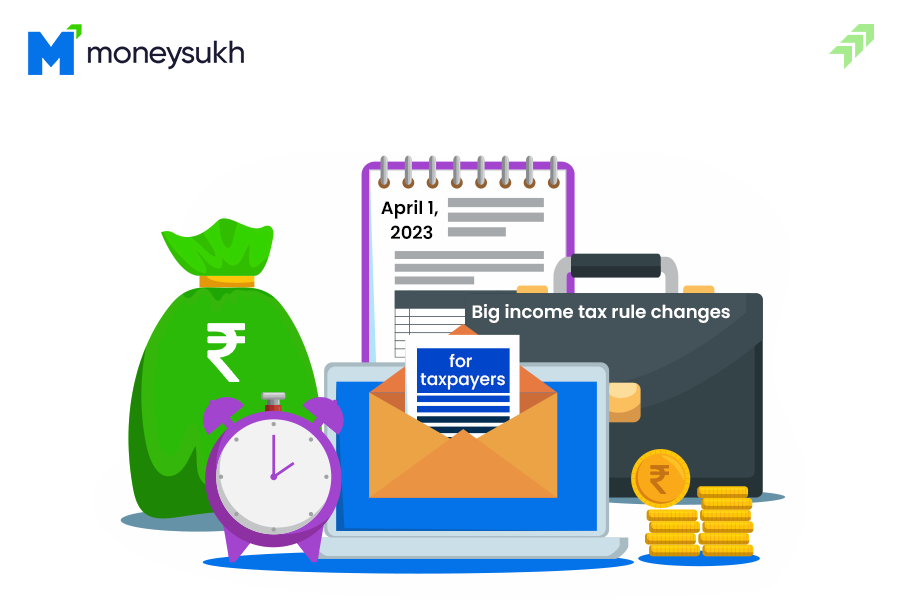As the new financial year of 2023-24 begins this week on April 1, 2023, taxpayers in India will be affected by several significant changes announced by the Union Finance Minister during her Budget speech. The changes range from the adoption of the new income tax regime, tweaked income tax slabs, and no LTCG tax benefit on some debt mutual funds. Here's the full rundown of changes that taxpayers should be aware of.
- New income tax regime to become the default regime
The Finance Minister stated in his budget address on February 1, 2023, that the new income tax regime will be the default tax regime beginning April 1, 2023. Taxpayers, on the other hand, will be offered the choice of choosing between two tax regimes: the existing one and the new tax regime. If they do not choose between any, the income tax will be computed in accordance with the new tax regime. The new tax regime is known as the Simplified Tax regime, and it provides lower tax rates if the individual is willing to forgo some deductions and allowances when calculating income taxes.
- Tax rebate
There is even good news for taxpayers who will choose the new income tax system and have taxable income that is slightly more than Rs 7 lakh per annum (after claiming the Rs 50,000 deductions). The tax rebate limit under Section 87A will be increased to Rs 7 lakh from Rs 5 lakh on April 1, 2023. This implies that anyone with a salary of less than Rs 7 will not be charged income tax at all. The total income will be tax-free, but only under the income tax system introduced in new financial year 2023. From April 1, the new system's normal deduction for taxable revenue surpassing Rs 15.5 lakh for paid persons and retirees will be Rs 52,500.
- Changes in Income Tax slabs
Many adjustments have been made in the new tax regime that will be applicable from the new financial year 2023, to make it more appealing to taxpayers.
| Old Tax Regime | New Tax Regime | ||
| Rate of Tax | Slab Rates | Slab Rates | Rate of Tax |
| NIL | ₹ 0 to 2.5 lakhs | ₹ 0 to 3 lakhs | 0% |
| 5% | ₹ 2.5 to 5 lakhs | ₹ 3 Lakhs to 6 Lakhs | 5% |
| 20% | ₹ 5 to 10 lakhs | ₹ 6 Lakhs to 9 Lakhs | 10% |
| 30% | Above 10 lakh | ₹ 9 Lakhs to 12 Lakhs | 15% |
| ₹ 12 Lakhs to 15 Lakhs | 20% | ||
| Above ₹15 Lakhs | 30% | ||
| Those earning 5 lakh are entitled for rebate | Those earning 7 lakh are entitles for rebate | ||
- No LTCG tax benefit on debt MFs
Individual buyers who invest in debt mutual funds should be aware that the amount invested will be taxed as short-term capital gains beginning April 1, 2023. Investors should not redeem any existing investments if they want to take advantage of the current YTMs provided by Debt Mutual funds and make investments before March 31, 2023, to profit from indexation and reduced taxation.
- Life and Term Insurance policies
The Union budget for 2023-24 which will be active from the new financial year has been a letdown for the insurance industry. The industry had anticipated a rise in limits under different provisions such as 80C and 80D, but on April 1, 2023, proceeds from life insurance payments exceeding Rs 5 lakh would be taxed. Any money earned on maturity in those plans that exceed a payment of Rs. 5.00 Lakh is taxable. This will result in a decrease in spending by High-Net-Worth Individuals. Customers use insurance policies as an investment and tax-saving tool, but now that the tax benefit is gone, customers may stop putting money into insurance policies as an investment vehicle.
- Leave Travel Allowance
Non-government salaried people' leave encashment allowance will be exempted up to Rs. 25 lakh from 1 April, up from Rs. 3 lakh previously.
- Reduction in the surcharge for HNIs
The Finance Minister has lowered the highest possible surcharge rate on High Net Worth Individuals (HNI) who choose the new tax system from 37% to 25%.
- Taxation of MLDs
From April 1, 2023, an investment vehicle i.e. Market Linked Debentures (MLDs), which is targeted towards HNIs clients, will no longer be favourable as the govt has put a new section 50AA w.e.f. 1.4.2023, providing that any gain arising on the transfer of MLDs, on or after 1 April 2023, will, by default, be treated and considered as a short-term capital gain and will be taxable at the applicable tax slab rate of the investor. Before 1 April 2023, any capital gains from such listed debentures are taxed at 10% after a holding period of more than a year. Furthermore, the grandfather clause is part of a new rule that does not extend to a specific set of people, allowing them to continue adhering to the old rule or law.
- NSE rolled back its 6% increase of transaction cost coming 1 April
The National Stock Exchange has chosen to roll back the 6% rise in transaction charges on the equity and derivatives segment, making equity dealing on the NSE's cash and derivatives segment more affordable. The exchange said in a statement that this will take effect on April 1, 2023.
- Winnings from online games will be taxable
Winnings from online games activities will be subject to income tax following the implementation of new Section 115BBJ. Any gains from such activities will be subject to a flat tax rate of 30%, which will be deducted from the earnings at the point of winning. This tax will apply to all kinds of winning, including cash, in-kind, vouchers, and any other sort of incentive.
- No tax on converting physical gold to an electronic gold receipt
During her Budget address, Finance Minister Nirmala Sitharaman stated that the government has gone a step further to promote electronic gold beginning April 1, 2023, by exempting capital gains tax while permitting the conversion of physical gold into electronic gold receipts. (EGR). The EGR will be issued by the authorised vault manager by the SEBI. The electronic receipt holder may keep the receipt for as long as he or she desires. An EGR holder can also take the underlying gold from the vaults at his leisure and convert it back to physical gold by surrendering the EGRs to the corresponding exchange.
- Benefits for senior citizens
The finance minister in the Union budget of 2023-24 has increased the maximum deposit limit under the senior citizens savings scheme (SCSS) from earlier Rs. 15 lakh to Rs. 30 lakh. The scheme provides 8 percent interest /- annum which will be paid every quarter.


















No comment yet, add your voice below!